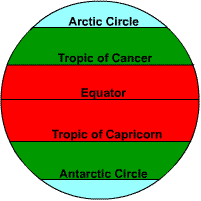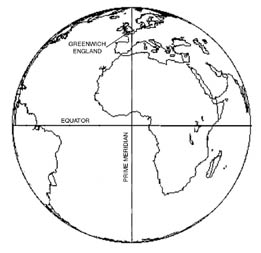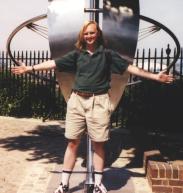|
 HOME
HOME
|
Latitude and Longitude

|
On a map or globe, there are horizontal and
vertical lines are called latitude and longitude lines. The lines of
latitude are numbered from 0 to 90 and are either north or south,
depending if they are north or south of the equator. The lines of
longitude are numbered 0 to 180 and are either east or west,
depending how far they are from the prime meridian.
Latitude
|
Latitude is the measure of how far north
or south a location is from the equator. Latitude is measure
in degrees. Each half of the earth or hemisphere is 180
degrees.
The equator is at 0 degrees latitude and
is stretches the diameter of the earth.
Latitude lines are imaginary lines that
go around the earth from side to side.
The latitude of an area is one factor in
the kind of climate the area might have. If an area is
located close to the equator, the climate will be very hot,
or tropical.
As one gets above the Tropic of Cancer or
Capricorn, the climate becomes milder, with hot summers and
cold winters This is called a temperate climate.
At the points furthest away from the
equator, the climate is cold and is called polar.
|

|
Longitude
|

|
Longitude is a measure of how far east or
west a place is from the Prime Meridian.
The Prime Meridian is in Greenwich
England and is an arbitrary place (that means that
scientists just said "let's go from here, lads!") from which
longitude is measured.
The longitude lines (or meridians as they
are sometimes called) are imaginary lines every 20 degrees
east or west of the Prime Meridian.
While the latitude of a particular
location affects its climate, the longitude can determine
the time zone a particular location is in.
When latitude and longitude lines are
overlaid on each other, they form a grid. If one knows the
latitude and longitude of a place, it is possible to locate
that place on a globe or map.
|
|
Here a tourist stands at the Prime
Meridian in Greenwich, England, with his left foot in the
Eastern Hemisphere, and his right foot in the Western
Hemisphere.
The reason Greenwich was chosen was
because scientists and astronomers worked from here to
measure the world, get accurate navigation tools, and
accurate clocks.
Have you ever heard of GMT (Greenwich
Mean Time?) If you ever go to England, go and visit
Greenwich.
|

|
Now that you are an expert on latitude and
longitude, test
yourself on this quiz!
(back to
top)


